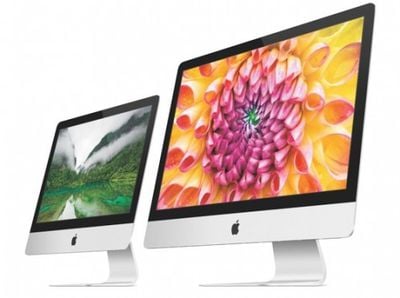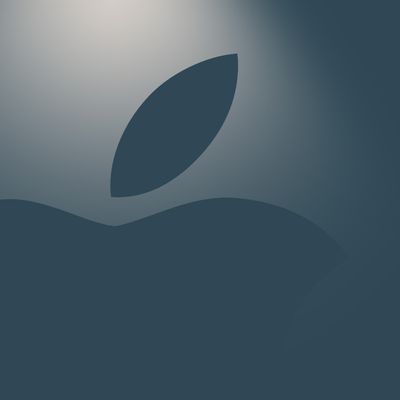iMac Discounts and Stock Shortages at Third-Party Retailers Hint at Approaching Haswell Update
Major third-party Mac retailers such as B&H and Amazon have begun offering discounts on various iMac configurations in recent days as Apple may be beginning to slow shipments of the computer in advance of a refresh featuring Intel’s Haswell processors, reports AppleInsider. The company seems to be slowing the flow of iMac units coming into its various sales channels as the next-generation iMac will likely be announced later in the fall after its September iPhone media event to allow Apple, its customers, and the media to focus on its flagship mobile device.

The discounts join sales efforts initiated earlier this month by Best Buy, Amazon, and MacMall -- all of which are similarly offering the four standard iMac retail configurations at discounts between $100 and $150. Given the new inventory management measures Apple adopted after January's MacBook Pro surplus scare, the discounts are likely the start of a multi-week effort to run its iMac channel fairly bare.
Previous reports indicated that the iMac would be updated to include Haswell processors in June or July as shipments sank, but an update to the computer was not announced at or soon after Apple’s annual Worldwide Developer Conference.
Earlier this year, a new Broadcom Wi-Fi/Bluetooth card supporting the latest 802.11ac Wi-Fi standard surfaced, with the card appearing nearly identical in size and shape to the custom card currently used in the iMac. The inclusion of 802.11ac support on the next-generation iMac is all but certain as the standard has already made its way into Apple's latest MacBook Air models and new AirPort Extreme and Time Capsule base stations.
Yesterday, a report surfaced that refreshed MacBook Pro models with Haswell chips would be coming in September, backed by evidence that Apple vendors may be trying to run down existing MacBook Pro stock. Data from U.S. research firm NPD released last month also indicated that U.S. Mac sales were down in June compared to the previous June, despite the introduction of the new MacBook Airs, with the lack of a refreshed MacBook Pro lineup cited as a primary contributing cause.
Popular Stories
While the iPhone 17 Pro and iPhone 17 Pro Max are not expected to launch until September, there are already plenty of rumors about the devices.
Below, we recap key changes rumored for the iPhone 17 Pro models as of April 2025:
Aluminum frame: iPhone 17 Pro models are rumored to have an aluminum frame, whereas the iPhone 15 Pro and iPhone 16 Pro models have a titanium frame, and the iPhone ...
If you missed the video showing dummy models of Apple's all-new super thin iPhone 17 Air that's expected later this year, Sonny Dickson this morning shared some further images of the device in close alignment with the other dummy models in the iPhone 17 lineup, indicating just how thin it is likely to be in comparison.
The iPhone 17 Air is expected to be around 5.5mm thick – with a thicker ...
While the so-called "iPhone 17 Air" is not expected to launch until September, there are already plenty of rumors about the ultra-thin device.
Overall, the iPhone 17 Air sounds like a mixed bag. While the device is expected to have an impressively thin and light design, rumors indicate it will have some compromises compared to iPhone 17 Pro models, including only a single rear camera, a...
Despite being more than two years old, Apple's AirPods Pro 2 still dominate the premium wireless‑earbud space, thanks to a potent mix of top‑tier audio, class‑leading noise cancellation, and Apple's habit of delivering major new features through software updates. With AirPods Pro 3 widely expected to arrive in 2025, prospective buyers now face a familiar dilemma: snap up the proven...
Apple plans to release an all-new super thin iPhone this year, debuting it alongside the iPhone 17, iPhone 17 Pro, and iPhone 17 Pro Max. We've seen pictures of dummy models, cases, and renders with the design, but Lewis Hilsenteger of Unbox Therapy today showed off newer dummy models that give us a better idea of just how thin the "iPhone 17 Air" will be.
The iPhone 17 Air is expected to be ...
Starting today, April 24, Apple Stores around the world are giving away a special pin for free to customers who request one, while supplies last.
Photo Credit: Filip Chudzinski
The enamel pin's design is inspired by the Global Close Your Rings Day award in the Activity app, which Apple Watch users can receive by closing all three Activity rings today. The limited-edition pin is the physical...
Apple's $570 million fine from the EU has triggered a sharp rebuke from the White House, which called the fine a form of economic extortion, Reuters reports.
The fine was announced on Wednesday by the European Commission, following a formal investigation into Apple's compliance with the bloc's Digital Markets Act (DMA), a landmark piece of legislation aimed at curbing the market dominance of ...
When an iPad running iPadOS 19 is connected to a Magic Keyboard, a macOS-like menu bar will appear on the screen, according to the leaker Majin Bu.
This change would further blur the lines between the iPad and the Mac. Bloomberg's Mark Gurman previously claimed that iPadOS 19 will be "more like macOS," with unspecified improvements to productivity, multitasking, and app window management,...























